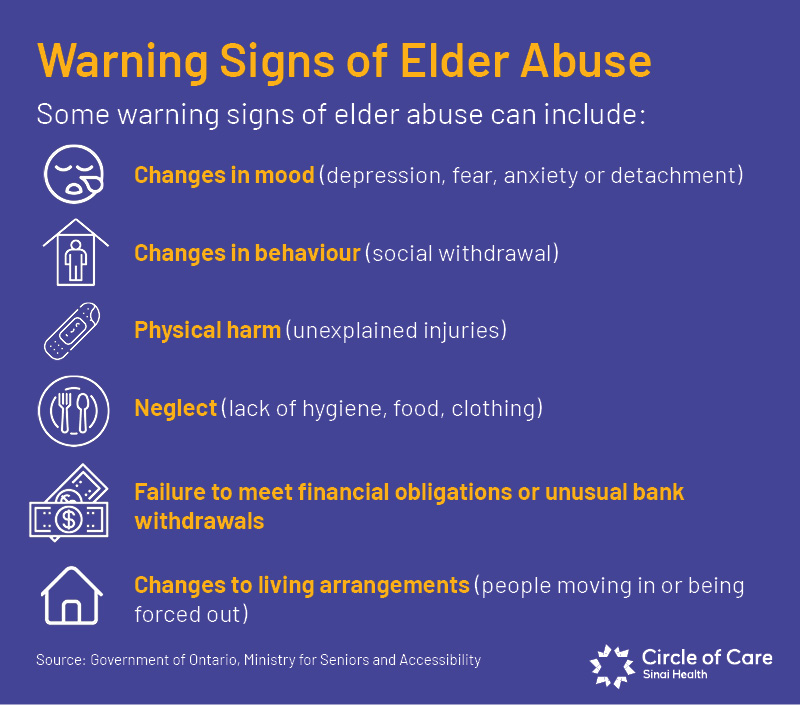Please see the domestic abuse page for more information and indicators of whether you are currently in an abusive situation.
This page is specifically geared at providing signs that a third party may recognize as abuse in vulnerable elders or children. Everyone has a legal duty to report suspected child abuse, even if you don't work with children. Simply believing that a neighbour, family friend, or other community member is a possible abuse victim is enough to mandate a report of suspected child abuse. Elder abuse is also often subject to mandatory reporting, with some variation in duty to report depending on the victim's living situation.
These lists are not all-inclusive. Additional signs not seen on this page may indicate abuse.
If you suspect abuse, make a report to the Child Protection Services or Adult Protection Services in your area. If you're not sure where to start, try calling police non-emergency lines to seek further direction.
Signs of Elder Abuse:
– Fearful, anxious, poor eye contact, baby talk
– Hesitant to speak openly, paranoid, ashamed
– Unusual or new level of anger, low self-esteem
– Appears underweight, malnourished, dehydrated
– Inadequate self-care, physical or oral hygiene
– Unwillingly signed over power of attorney
– Possessions missing, lack of money
– Caregiver appears indifferent or angry
– Caregiver does not visit elder or offer assistance
– Caregiver is always present and answers for the elder
– Broken dentures, hearing aids, or other devices
– Complains of genital irritation, such as pain or itching
– Areas of baldness or damaged hair from hair pulling
– Bruises, welts, bites, burns, bloodshot eyes, bedsores
– Explanations for injuries are insufficient or inconsistent
– Exaggerated or absent emotional response from caregiver for injury

Signs of Child or Adolescent Abuse:
Note: "Child" may be "adolescent", "parent" may be "caretaker"
– Parent ignores, fails to comfort, or actively rejects child
– Little to no positive reinforcement is provided to child
– Child's social, educational, physical needs are ignored
– Harsh, cruel, negative, or belittling comments to child
– Toddler doesn't protest parent leaving the room
– Child appears to prefer other adults over the parent
– Anxious, fearful, poor sleep, odd emotional reactions
– Self-destructive behaviours, self-isolates, steals, cheats
– Complains of genital irritation, such as pain or itching
– Non-parent adult becomes close friend or indicates favoritism
– Child is made to feel special, receives gifts, secrecy required
– Child has been threatened to not share details of special friendship
– Boundary violations, no safe/private space for child like bedroom
– Parent spends excess time with child, especially in room or at night
– Very attentive parent, may be contrasted with apprehensive child
– Child has unusual sexual behaviour such as body language or jokes
– Low self-esteem, changes in mood, sudden poor school performance
– Areas of baldness or damaged hair from hair pulling
– Bruises, welts, bites, scratches, scalds, cigarette burns
– Explanations for injuries are insufficient or inconsistent
– Parent angry toward or blaming child or sibling for injury
– Exaggerated or absent emotional response from parent for injury
